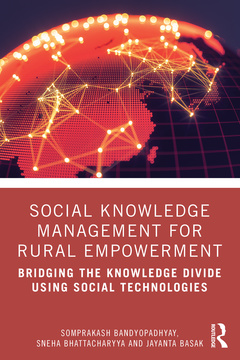Social Knowledge Management for Rural Empowerment Bridging the Knowledge Divide Using Social Technologies
Auteurs : Bandyopadhyay Somprakash, Bhattacharyya Sneha, Basak Jayanta

This book develops and examines the concepts and strategies for rural empowerment through the formation of a community-driven social knowledge management (SKM) framework aided by social technology. The framework is aimed at mobilizing knowledge resources to bridge the rural?urban knowledge divide while securing rural empowerment using digital connections and social collaborations built on strategies of self-sustenance and self-development. With key empirical findings supplemented by relevant theoretical structures, case studies, illustrative figures and a lucid style, the book combines social technologies and social development to derive a social knowledge management platform. It shows how the proposed SKM framework can enhance knowledge capabilities of rural actors by facilitating connection among rural?urban entities through formation of purposive virtual communities, which allow social agents to create, modify and share content collaboratively.
The volume brings forward diverse issues such as conceptual foundations; bridging the rural?urban knowledge and information divide; issues of information and knowledge asymmetry; a knowledge-theoretic perspective of rural empowerment;knowledge capability, freedom of choice and wellbeing, to provide a comprehensive outlook on building a knowledge society through digital empowerment.
This book will be useful to scholars and researchers of development studies, rural sociology, management studies, IT/IS, knowledge management and ICT for development, public policy, sociology, political economy and development economics. It will benefit professionals and policymakers, government and nongovernment bodies and international agencies involved with policy decisions related to application of technologies for rural development, social workers and those in the development sector.
1. Introduction PART I. Rural Empowerment: Bridging Rural–Urban Knowledge and Information Divide 2. Knowledge, Knowledge Divide and Knowledge Capability: A Conceptual Framework 3. Rural Empowerment: A Knowledge-Theoretic Approach 4. Contemporary Initiatives Undertaken for Rural Empowerment 5. Information Asymmetry and Rural Producers 6. Knowledge Asymmetry and its Mitigation through Enhancement of Knowledge Capability PART II. Social Knowledge Management and Social Technologies: Conceptual Foundations 7. Knowledge Management and its Evolution in Organizational Context 8. Social Technology and Knowledge Management Practices 9. Efforts Undertaken to Manage Social Knowledge and Information for Social Benefit 10. Social Knowledge Management: A Social Technology-enabled Framework to Bridge Knowledge Asymmetry of Rural Producers through Virtual Community Formation PART III. Social Knowledge Management in Action: Some Empirical Studies in Rural India 11. Cultivating Online Communities of Practice to Facilitate Practice-Oriented Rural-Urban Knowledge Exchange through Collaborative Learning Spaces 12. Cultivating Communities of Purpose to Enhance Market Opportunities of Rural Producers through Collaborative Knowledge Transaction 13. Cultivating Communities of Circumstance to Enhance Community Resilience through Knowledge Sharing using Collaboration and Connections Part IV. What Tomorrow May Bring 14. Summery and Discussions 15. Building a Developmental Ecosystem for Rural Empowerment
Somprakash Bandyopadhyay is Professor, Management Information Systems Group, Indian Institute of Management Calcutta, Kolkata, India. With a PhD in Computer Science, he has nearly 40 years of experience in teaching, research and technology development in several organizations of international repute. He was a fellow of the Alexander von Humboldt Foundation, Germany and fellow of the Japan Trust International Foundation. He is the Founder-Director of Social Informatics Research Group at Indian Institute of Management Calcutta.
Sneha Bhattacharyya isResearch Associate, Social Informatics Research Group, Indian Institute of Management Calcutta, Kolkata, India. With an M.Phil. in Social Sciences, her interests are in applying social techniques to optimally disseminate internet-enabled technology for upliftment of marginalized communities.
Jayanta Basak isSenior Research Associate, Social Informatics Research Group, Indian Institute of Management Calcutta, Kolkata, India. He has an M.Tech in Computer Science and works in the areas of design and development of Social Information Systems for social development. He is also the Co-Founder-Director of NexConnect, a social business venture based in Kolkata for social inclusion through digital inclusion.
Date de parution : 09-2020
15.6x23.4 cm
Date de parution : 09-2020
15.6x23.4 cm
Thèmes de Social Knowledge Management for Rural Empowerment :
Mots-clés :
Knowledge Capability; Knowledge Management; Community of Circumstance; Rural Urban Communities; Community of Practice; Rural Members; Community of Purpose; Knowledge Asymmetry; Developmental Ecosystem; Knowledge Acquisition; Information Asymmetry; Contemporary Digital Technologies; Tacit Knowledge Resource; Rural Producers; Knowledge Divide; Knowledge Management Practice; Knowledge Transactions; Opportunity Structure; Collaborative Learning Spaces; Rural Empowerment; Contemporary Society; Social Capital; Crowd Knowledge; Social Knowledge Management; Social Technology; Organizational Knowledge Management; social development; Virtual Community Formation; social workers; social technologies; Opportunity Prospects; Knowledge Asset; Knowledge Resources; Contemporary ICT; Rural Participants; Blended Mode
